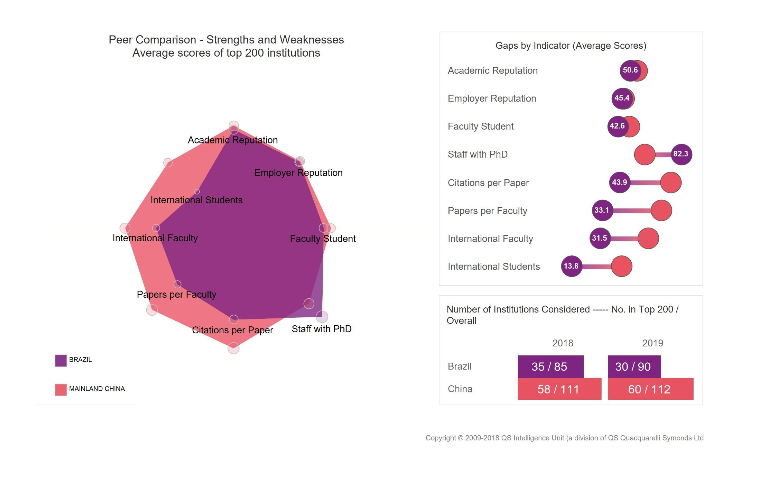
This year, QS Regional Rankings: BRICS results indicate that Brazilian universities are failing to keep pace with their competitors, with more than 60% of the 90 ranked Brazilian universities falling year-on-year: a trend that compounds a decreasing presence in the top 50 over the last five years.
Back in 2015, Brazil had nine institutions among the top 50 – only five remain in the 2019 edition.
Furthermore, only two Brazilian universities feature in the top 20, fewer than not only China – which dominates the ranking – but also India and Russia. Both of these Brazilian top-20 entrants have fallen: the Universidade de Sao Paulo has dropped from 13th to 14th, while Unicamp has regressed even more sharply, sliding from 12th to 16th.
By examining metric-by-metric data for the top 50 Brazilian institutions in this ranking, it is clear that Brazilian stagnation is primarily attributable to under-performance in two main indicators: citations per paper and international student ratio. Investing in internationalization typically facilitates a strengthening of communication channels with other countries. The refinement of this dialogue can positively influence how the country’s research is produced and perceived by the international community, increasing its visibility and chances of being cited.

Last year, an austerity plan which freezes educational expenditure for the next 20 years was implemented, affecting the financial planning of 68 public institutions displayed in the ranking. Concomitantly, in August of this year, the president of one of the most important agencies for higher education funding in Brazil – CAPES – wrote a warning letter to the Minister of Education announcing that, in light of the current restrictive budget, the institution would need to cancel the funding of 93,000 graduate students and 150,000 recipients of training programs.
As though to underline Brazil’s educational struggles, the 200-year-old National Museum, part of the Universidade Federal do Rio de Janeiro (UFRJ), suffered a fire that provoked the destruction of most of its collection, representing an irreversible social and academic loss.
Bench-marking institutions and national higher education systems against their peers is a central purpose of this analysis, and the 2019 edition of QS BRICS ranking indicates Brazil is not matching the accelerating pace of other nations in this exercise. Those results are not necessarily surprising, since they are caused by, and expressive of, economic, political and social challenges the country is facing.
Click here to access the full QS BRICS 2019 Rankings supplement.



